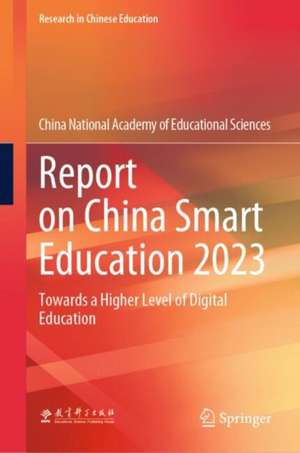Report on China Smart Education 2023: Towards a Higher Level of Digital Education: Research in Chinese Education
Autor China National Academy of Educational Sciencesen Limba Engleză Hardback – 14 oct 2024
This book serves as a valuable resource for teachers, education administrators, education researchers, and other readers who are interested in educational innovation and development in China.
Preț: 887.38 lei
Preț vechi: 1082.16 lei
-18% Nou
Puncte Express: 1331
Preț estimativ în valută:
169.80€ • 177.76$ • 140.50£
169.80€ • 177.76$ • 140.50£
Carte disponibilă
Livrare economică 15-29 martie
Preluare comenzi: 021 569.72.76
Specificații
ISBN-13: 9789819750894
ISBN-10: 981975089X
Pagini: 200
Ilustrații: Approx. 200 p.
Dimensiuni: 155 x 235 mm
Greutate: 0.34 kg
Ediția:2024
Editura: Springer Nature Singapore
Colecția Springer
Seria Research in Chinese Education
Locul publicării:Singapore, Singapore
ISBN-10: 981975089X
Pagini: 200
Ilustrații: Approx. 200 p.
Dimensiuni: 155 x 235 mm
Greutate: 0.34 kg
Ediția:2024
Editura: Springer Nature Singapore
Colecția Springer
Seria Research in Chinese Education
Locul publicării:Singapore, Singapore
Cuprins
Preface.- Chapter 1 Core Philosophy of China Smart Education.- Chapter 2 Policy Promotion of China Smart Education.- Chapter 3 The Innovative Development Paths of China Smart Education.- Chapter 4 Practical Cases of Smart Education in China: Regional promotion based on the SMART EDUCATION OF CHINA.- Chapter 5 Practical Cases of Smart Education in China: Data-driven curriculum and research innovation in higher education and vocational education.- Chapter 6 Practical Cases of Smart Education in China: Quality and fairness of basic education based on resource sharing.- Chapter 7 Development Trends and Future Prospects of Smart Education.
Notă biografică
The China National Academy of Educational Sciences (CNAES) is a comprehensive national-level education research institution affiliated with the Ministry of Education of the People’s Republic of China. Founded in 1941, and officially re-established in 1957, the academy is committed to contributing to the policy-making process, developing education theories, guiding educational practices, and collaborating with educational research institutes all over China. It aims to build an advanced national think tank in education that provides intellectual support to accelerate the modernization in China’s education, help build a well-educated population, and develop education that meets the expectations of the people. Focusing on national priorities and development strategies, the CNAES strives to advance studies on various topics regarding common concerns of the central government, society, and the public. The CNAES conducts a series of important research projects such as the final evaluation of the ten-year National Education Plan, projects on educational response to COVID-19 pandemic and artificial intelligence, family–school cooperation, public educational service system, vocational and technical education system, etc. These research projects have achieved important results and made great contributions to the reform and development of education in China.
Textul de pe ultima copertă
This book provides a comprehensive overview of the development of smart education in China. It defines smart education as a higher level of digital education that can be divided into four stages, including resource sharing, data-driven, integration with AI, and ecology reshaping. It proposes five practical paths for the development of smart education in China, such as cultivating innovation literacy as its goal and data empowerment as its core, and it develops an evaluation framework consisting of four dimensions, including extensive connectivity, innovative application, mechanism guarantee, and literacy improvement. Finally, it also identifies five trends in the global development of digital education.
This book serves as a valuable resource for teachers, education administrators, education researchers, and other readers who are interested in educational innovation and development in China.
This book serves as a valuable resource for teachers, education administrators, education researchers, and other readers who are interested in educational innovation and development in China.
Caracteristici
Provides an authoritative and comprehensive report on the development of smart education in China Showcases theoretical innovations, policy evolutions, and practical explorations in smart education in China Presents twenty case studies on innovative applications of digital education in China



